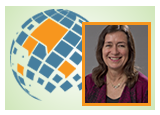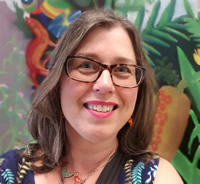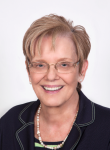From the President: A Look Back and A Look Ahead
by Deborah J. Short
 It is common during this time of year to see “Best Of”
lists—best books, best songs, best films, and the like. In this column, I’d
like to share five items on my Best of TESOL 2020 list. The items are not in a
ranked order, nor are they exclusive. In fact, I’d love to see items that would
be on your list in the comments section below. Nevertheless, here they
are:
It is common during this time of year to see “Best Of”
lists—best books, best songs, best films, and the like. In this column, I’d
like to share five items on my Best of TESOL 2020 list. The items are not in a
ranked order, nor are they exclusive. In fact, I’d love to see items that would
be on your list in the comments section below. Nevertheless, here they
are:
1. TESOL’s 2020 Virtual Convention. Kudos are still
to be offered to the Strategic Events staff at the TESOL office and the members
of the Conferences Professional Council for pulling off the feat of holding a
very successful 2020
Virtual Convention with only 4 months of preparation. We cancelled
our Denver Convention in mid-March last year, but by mid-July, they had us up
and running with close to 100 sessions during the 3-day convention, which was
attended by about 4,000 participants from 130 countries. They will do an even
better job, no doubt, with our Virtual
Convention in March 2021.
2. myTESOL Lounge Live. In response to the global
pandemic and the closing of physical schools, TESOL launched a new, free,
online chat opportunity known as myTESOL
Lounge Live in May. Anyone around the world interested in English
language teaching could join the online meetings, not solely members of TESOL.
The 14 sessions were hosted by TESOLers—18 hosts, in fact, from eight different
countries—and were mostly open discussions around a specific topic. By mixing
whole group and breakout room discussions, these gatherings allowed us to feel
more connected in a time of high stress and unpredictability.
3. Seal of Biliteracy Updated Guidelines. TESOL,
ACTFL, and five other organizations updated
the 2015 guidelines for the Seal of Biliteracy, making it more
accessible to students from a wider range of language backgrounds by
authorizing more pathways to attainment and providing implementation guidance
for states, districts, and other entities. The seal is an award that students
who have demonstrated proficiency in two languages have added to their high
school diplomas in the 40 states and the District of Columbia that have adopted
it. It may also be added to a college or university diploma. Although initially
developed as a U.S.-based achievement, the Seal of Biliteracy can be adopted by
ministries of education and educational programs around the world.
4. Membership Professional Council. TESOL launched
its newest professional council this year, dedicated to engaging our members
and helping new members in particular become active participants in the TESOL
community. The members of the Membership
Professional Council have been reaching out to new and potential
TESOLers through our myTESOL
lists and other venues, such as affiliate
conferences. A pilot New Member Mentoring Program began in November,
which will pair new members with mentors for their first year.

5. TESOLers Helping TESOLers. This is my catchall
category for the wonderful ways in which TESOL members have helped one another
with webinars, resource collections, online chats, social media supports, and
more. When the going got tough, as the idiom says, our English language
teaching community got going. Through our interest sections, professional
learning networks, professional councils, and global affiliates, we shared
ideas and expertise about teaching remotely, managing our students’
socioemotional needs, reducing stress, finding supplementary materials,
assessing students virtually, incorporating social justice topics into lessons,
and so much more. Our TESOL groups held more than 35 webinars, for example, on
TESOL’s platform and numerous other sessions through Facebook Live, university
Zoom accounts, and other modes. One event, ELT
Day for Puerto Rico, happened before we knew about the COVID-19
virus, proving our commitment to helping colleagues was not dependent on a
global pandemic but is a value we all share.
It is also
common at this time to think about the year to come. So, besides looking back
at 2020, I also want to look ahead and offer three wishes for 2021.
1. Extra funding for schools to close the academic learning gap that
has occurred among students during the pandemic. We know
students will need more supports, including extra learning time, more staff,
and modified curricula, in order to catch up on reported learning losses. My
wish is for nations and states to view educators as essential workers with
priority for vaccines and to invest heavily in education.
2. Changes to teacher education and hiring practices.
The past 9 months have shown us that having a highly qualified teacher is key
to effective learning. My wish here has two parts. First, universities should
train all preservice teachers in techniques for remote instruction and methods
for teaching language and content to new learners of the language of
instruction. Second, schools, programs, and businesses should hire teachers
based on their educational backgrounds and credentials, not their native
language.
3. Continued attention to diversity, equity, and
inclusion. The cries for reducing systemic racism have been
heard around the world. In the new year, we must all look at ourselves, our
classrooms, and our workplaces for bias, discrimination, and structures that
limit diversity and inhibit inclusion and work to dismantle them. We must
actively promote practices that lead to equity and access. We should be more
culturally responsive in our teaching and find opportunities to mentor teachers
and researchers from underrepresented and marginalized communities.
My final,
fervent wish is for your health and safety in 2021. Thank you for your
dedication to English language teaching. I hope we will be able to see each
other, in person, soon.
Deborah J. Short, PhD, is TESOL International Association president (2020–2021). She directs Academic Language Research & Training, LLC and provides professional development on academic literacy, content-based ESL, and sheltered instruction worldwide. She has led numerous research projects related to English learner education, codeveloped the SIOP Model, and served as series editor for several 6 Principles books.
TESOL Blogs
Interested in writing a blog for TESOL?
Read the submission guidelines and send us your post!
Check out some of the most recent TESOL Blogs:
|
The Polar Challenge Game for EL Collaboration, by A. C. Kemp

You may have played the “desert island” game before: You’re put in a group and asked to work together to choose a limited number of items you’d want to have with you if you were stuck on a desert island together.
As the weather here in New England gets colder, I like to play a variation on this game called the Polar Challenge, in which my students are “sent” to a secret location above the Arctic Circle for 2 years as punishment for an imaginary crime. As in the desert island game, the idea is for groups to work together to figure out what they will need to survive in a remote area. Read more. |
|
Providing Inclusive Holiday Activities to ELs, by Judie Haynes

Many elementary-age English learners (ELs) in the United States spend a good part of December discussing Santa, elves, and reindeer. They listen to stories about Santa and his trip around the globe. They make presents for their parents and participate in discussions about what they want for Christmas. ELs sing Christmas songs, many of them based on the religious aspects of Christmas.
Parents of ELs may not realize that most of their children’s classmates would receive gifts from Santa, and they may not be aware of how left out their child feels. Unfortunately, many of us give little thought to the children who are looking in from the outside during our celebration of December holidays. Read more. |
|
4 Video Game Tricks for Online Learning, by Jeff Kuhn
 Hello and welcome to another edition of the TESOL Games and Learning blog! Recently, I had the opportunity to speak to a group of Fulbright foreign language educators about ways to incorporate elements of video game design into their online courses. For this month’s post, I thought I would share a condensed version of that talk. Hello and welcome to another edition of the TESOL Games and Learning blog! Recently, I had the opportunity to speak to a group of Fulbright foreign language educators about ways to incorporate elements of video game design into their online courses. For this month’s post, I thought I would share a condensed version of that talk.
An effective online course and a video game have much in common. Most important, they are intentionally designed objects. That means the experience of the user, not the content or the objective, is the first concern of the designer, and everything is designed to help the player/learner to understand the environment. To start, let’s take a look at one example of a well-designed game: Super Mario Bros. Read more. |